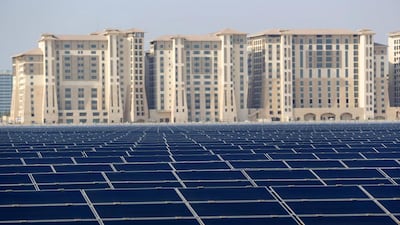The UAE is looking to increase its target for power generation from clean energy to 30 per cent by 2030, the energy minister said yesterday.
"What we know is that at least 25 per cent [of electricity] is going to be from both nuclear and solar," Suhail Al Mazrouei said after a ceremony to launch the third annual State of Energy report.
“But there is potential to go to 30 per cent. It will depend on the number of projects we have and we are evaluating and putting these things together now,” he added.
Under the government’s current plans, nuclear power is the main source of non-hydrocarbon based electricity generation.
Four new South Korean-designed nuclear reactors are due to come online between 2017 and 2020, each with generating capacity of 1,400 megawatts. They will provide an estimated 25 per cent of the country’s electricity demand by 2020, replacing primarily the natural gas-generated electricity that makes up the bulk of power generation at present.
The additional renewable energy power generation in the country comes primarily from solar power.
Mr Al Mazrouei noted that the economics of solar power had been improving rapidly in recent years, noting the record-setting bid at the end of 2014 in Dubai for a 100MW solar power plant at US$5.98 per kilowatt hour.
That price is competitive with natural gas prices even after the further decline of oil and gas prices on international markets.
Last year, the government estimated that savings of between $1 billion and $3.7bn could be achieved by hitting its renewables target and now believes the savings could be even greater with the changed outlook for fossil fuels and renewable energy prices.
Mr Al Mazrouei praised plans to build up to 3,000MW at the Sheikh Mohammad bin Rashid Al Maktoum solar power park and said the post-oil economy in the Arabian Peninsula could be driven by solar.
“This is a very interesting time in the industry when the importance of renewable energy is at its peak after COP21 and when commodity prices have fallen significantly,” Mr Al Mazrouei said.
"Solar has an even greater role to play when it competes with steady sources of electricity supply, not just on the cost of generation," he said. "When it's availability is improved from 25 per cent to 40 or 50 per cent … we need to see technology evolving to cheaper ways of storing solar- generated power, then we could see the peninsula exporting [solar power] to Europe."
amcauley@thenational.ae
Follow The National's Business section on Twitter

